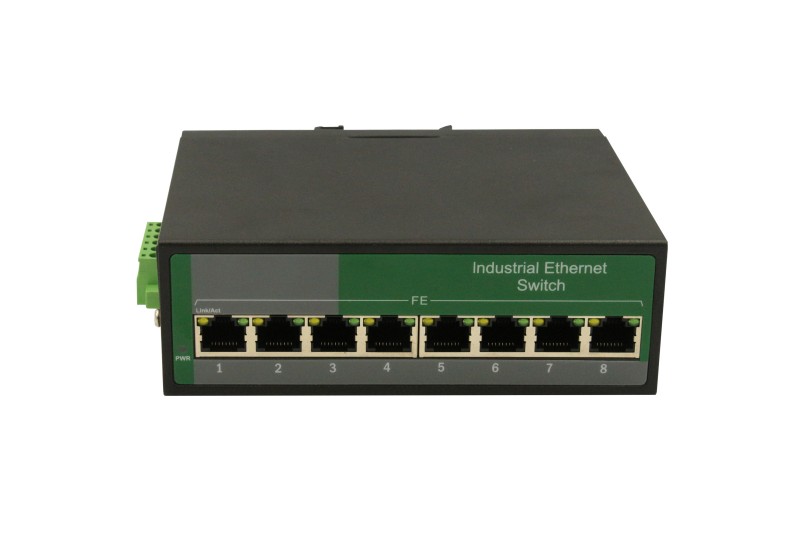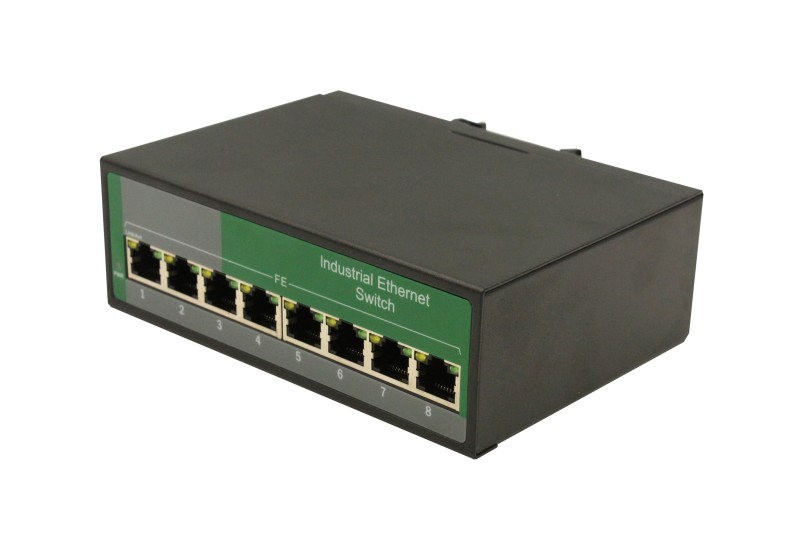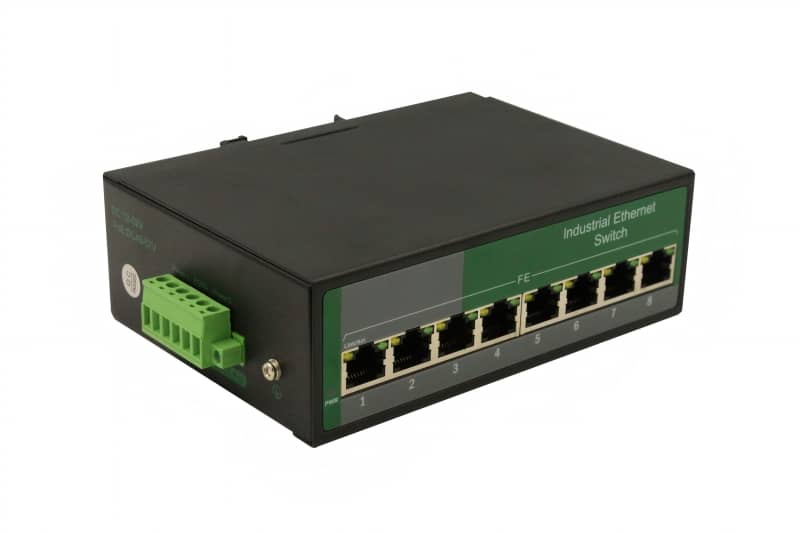.

In an age where high-speed connectivity is often the norm, one might wonder if a 100Mbps port industrial switch still has a place in today’s manufacturing and industrial networks. Despite the prevalence of Gigabit speeds in many consumer and enterprise applications, the advantages of a 100Mbps solution are clear when it comes to industrial settings. In this article, we explore why a 100Mbps industrial switch can be a smart choice for certain applications, particularly for smaller-scale or specialized network installations, and what benefits an 8 port industrial switch might bring to your operation
The Industrial Environment: Unique Requirements
Industrial networks differ significantly from typical office or data center networks. In manufacturing plants, utilities, and similar environments, networks often face challenges that go beyond mere speed. The harsh conditions, electromagnetic interference, temperature fluctuations, and vibrations require equipment with robust build quality and focused performance parameters. A 100Mbps port industrial switch is designed to meet these unique challenges through:
Rugged Construction: Industrial switches are built to withstand extreme conditions.
Stable Throughput: While high-speed connectivity is essential, many industrial applications do not require the maximum bandwidth available on Gigabit networks.
Reliability: Consistent network performance and long-term durability are often more crucial than cutting-edge speed.
By opting for a switch that uses 100Mbps ports, manufacturers can ensure stable connections in environments where fluctuations in network performance can lead to operational disruptions.

Cost-Effectiveness and Efficiency
One of the principal advantages of a 100Mbps industrial switch is its cost-effectiveness. In many industrial deployments, the budget can often be tight, and the overall network requirements may not justify the higher price tag associated with Gigabit hardware. Here’s why a 100Mbps port industrial switch is a compelling choice in terms of cost and efficiency:
Lower Capital Investment: The overall cost of 100Mbps components is generally lower, making them a budget-friendly option, especially when an 8 port industrial switch configuration is used.
Energy Efficiency: Lower-speed switches often consume less power. This can result in lower operational costs over the lifespan of the network equipment.
Simplified Management: Managing a network with fewer high-speed ports can simplify configuration and maintenance, particularly when working with a smaller network segment in industrial settings.
For many organizations, partnering with a reputable 8 port industrial switch manufacturer can mean receiving tailored solutions that optimize performance while adhering to budgetary constraints.

The Case for an 8 Port Industrial Switch
An 8 port industrial switch is a popular configuration for many industrial applications. It offers a balanced mix of connectivity, manageability, and space-saving design. Here’s why an 8-port setup often makes sense:
Scalability for Small Networks: Many industrial installations have a limited number of devices. An 8-port configuration is sufficient for connecting sensors, controllers, and monitoring devices without overshooting your needs.
Space and Energy Savings: Fewer ports mean a more compact design and reduced power consumption, which can be critical in confined spaces or setups with power limitations.
Ease of Integration: An 8 port industrial switch is ideal for segmented networks where a designated section of the factory floor requires dedicated, isolated connectivity.
Cost Benefits: Fewer ports naturally mean a lower cost, and if your devices do not demand multi-gigabit connectivity, a 100Mbps solution is sufficient for current and near-future network demands.
Reliability and Longevity in Harsh Environments
The industrial setting demands reliable networking equipment that can perform regardless of environmental conditions. Industrial switches – particularly those built as a 100Mbps port industrial switch – are built with durability in mind:
Environmental Tolerance: These switches are often designed with extended temperature ranges, protection against dust and moisture, and resistance to shock and vibration.
Consistent Performance: Over-engineering for ruggedness typically yields highly stable throughput and fewer intermittent connectivity issues.
Vendor Support and Warranty: Many leading 8 port industrial switch manufacturers back their products with robust warranties and long-term support contracts, ensuring longevity and reliability over many operational cycles.
Choosing equipment that you know will maintain performance in the rigors of industrial use is vital for avoiding costly downtime and maintaining process control.

Network Segmentation and Traffic Management
Industrial networks tend to be highly segmented. Separating control networks from administrative networks, or isolating critical sensor data from bulk data traffic, is paramount for security and performance. A 100Mbps industrial switch can provide advanced features to support network segmentation such as:
VLAN Support: Creating multiple virtual networks to segregate data traffic improves overall network performance and enhances security.
Quality of Service (QoS): Prioritizing critical traffic such as control signals or real-time sensor data is easier to manage on a dedicated industrial switch.
Routing Capabilities: While a 100Mbps switch might not offer the raw speed of a Gigabit model, many switches in this category still support advanced routing protocols to ensure that data is directed along the most efficient paths.
These features allow industries to achieve a higher level of control and efficiency. Whether it’s a small automation cell or a larger network segment, an effective 8 port industrial switch can serve as the backbone for traffic management and reliable communication.
Considerations for Choosing a 100Mbps Industrial Switch
Before making a final decision, consider the following factors to determine if a 100Mbps port industrial switch is right for your application:
Network Load and Bandwidth Requirements: Assess whether your connected devices and data volume require high-speed Gigabit connections or if a 100Mbps configuration is sufficient.
Budget Constraints: Evaluate the total cost of ownership, including purchase price, operational costs, and long-term maintenance.
Environmental Demands: Ensure the switch meets the rugged specifications required by your industrial environment.
Scalability and Future-Proofing: Consider whether your network may need to expand over time. An 8-port solution may suffice now, but plan for potential upgrades.
Vendor Reputation: Work with a well-established 8 port industrial switch manufacturer known for robust support and high-quality products.
Conclusion:
In many industrial applications, a 100Mbps industrial switch offers an ideal balance of cost, efficiency, and reliability. For factories, automation systems, and other environments where extreme data speeds are less critical than consistent performance and robust design, opting for a 100Mbps solution can be the most practical choice. An 8 port industrial switch configuration provides sufficient connectivity for many small-to-medium industrial networks. When sourced from a reputable 8 port industrial switch manufacturer, these devices come with the rugged features needed to thrive in harsh conditions and support seamless network segmentation. Ultimately, if your industrial application does not demand the highest bandwidth available on Gigabit networks, a 100Mbps port industrial switch may be the smart, reliable, and cost-effective solution for your network infrastructure. Making the right choice ensures that your network remains robust, manageable, and ready to support the smart manufacturing processes of today and tomorrow.


